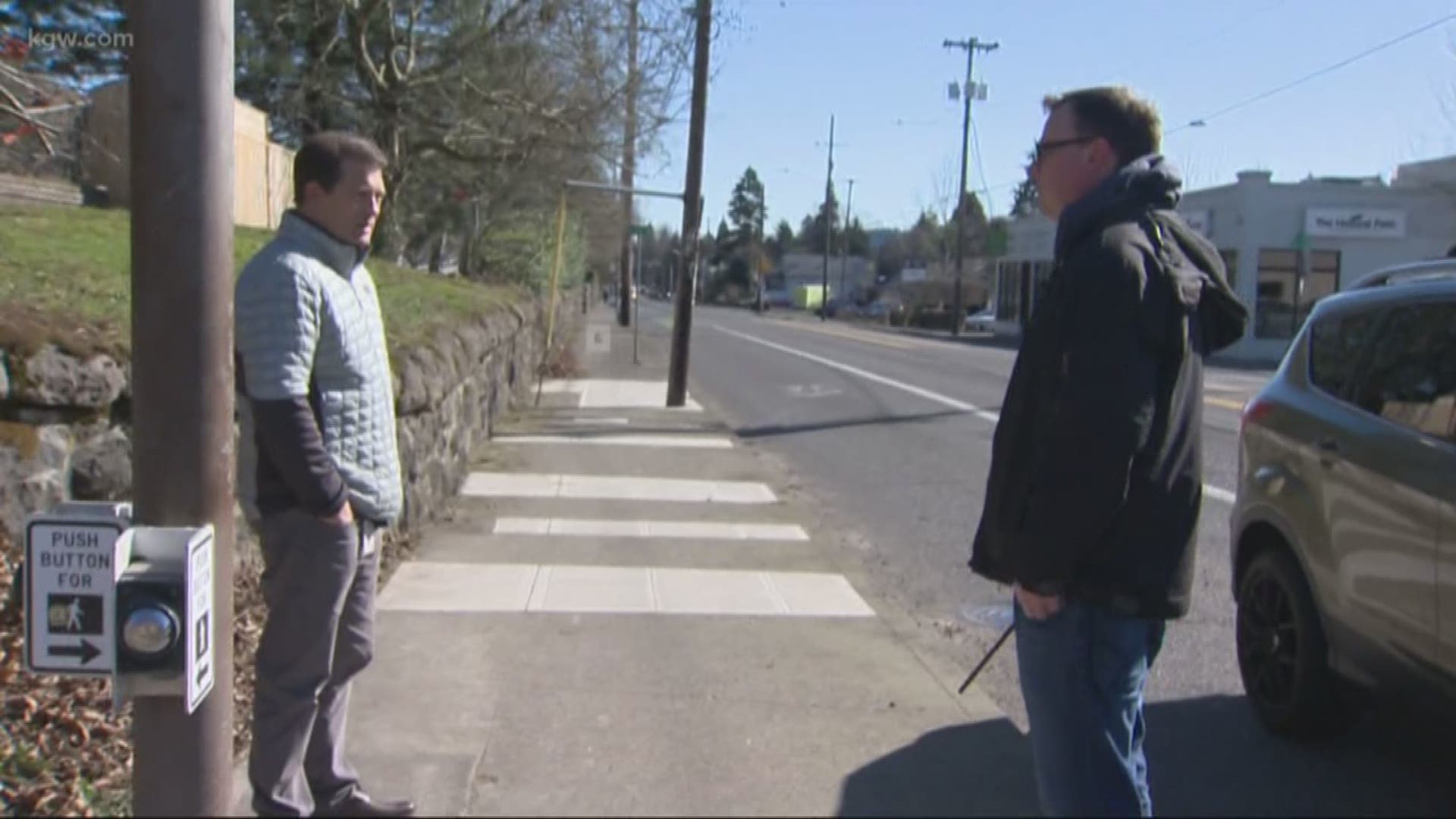Portland's sidewalk repair policy trips up homeowner with costly bill
It's the first appeal to the city council in 20 years. "It's tough to fight City Hall," he says. However, apparent sidewalk violations exist by the homes of Portland elected officials.
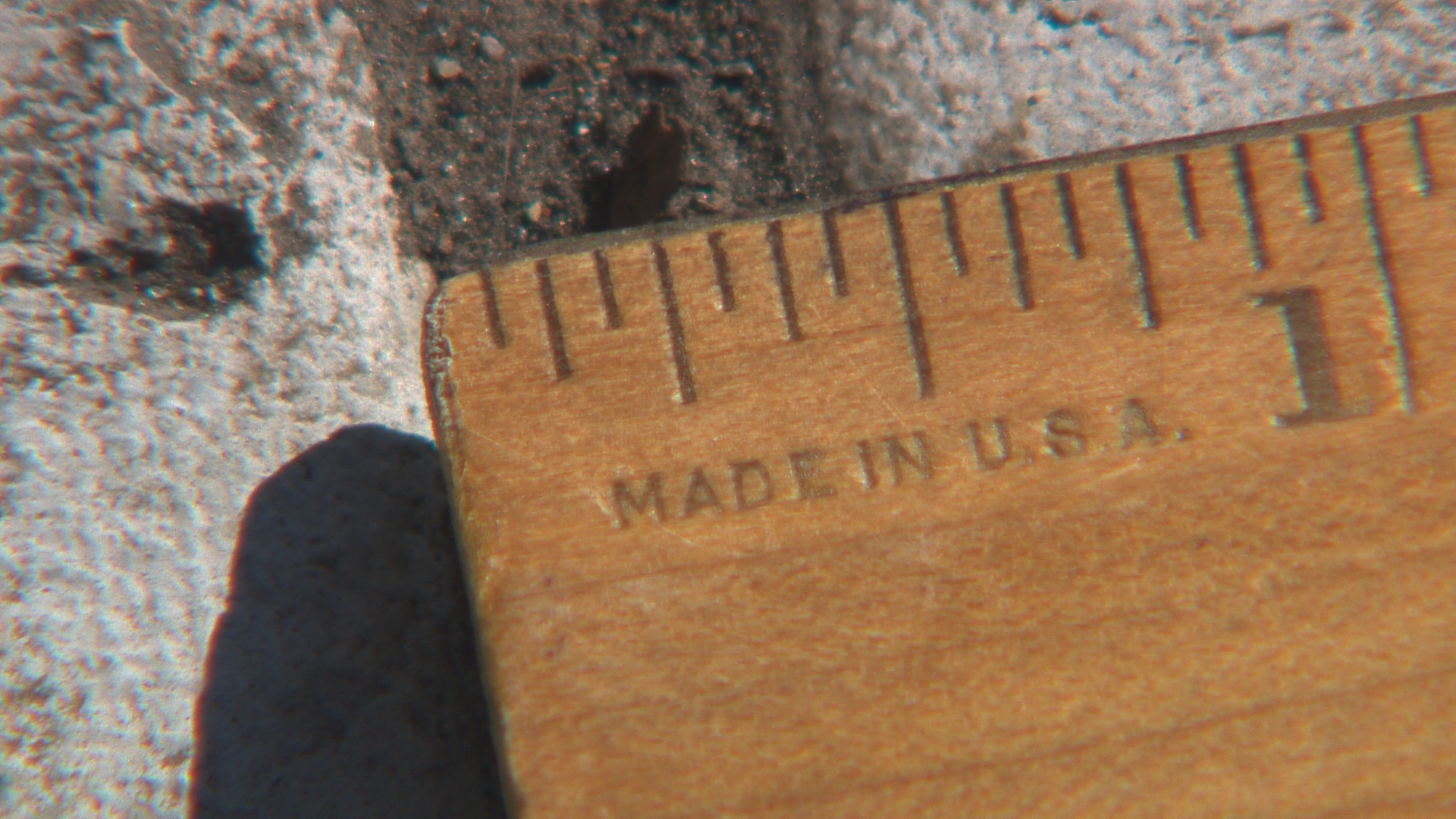
A Portland man is facing thousands of dollars for "sidewalk repair" charges for what he says were unnecessary fixes.
Homeowner Kyle Bell says his sidewalk was fine - no tripping hazards, no large cracks and no dips. But the City of Portland deemed it to be a hazard and that it had to be repaired. The total cost of the project was $7,321.
So the Portland Bureau of Transportation hired a crew to do the work and sent Bell the bill.
“Everything became sort of opinion at some point,” he said, “and the opinion of the homeowner doesn't count. There was no tripping hazards; nothing was raised at all.”


Half-inch standard Not measuring up
Sidewalk repair in Portland is complaint-based. But no one complained about Bell's sidewalk in Southeast Portland. Instead, someone complained about the sidewalk elsewhere on the street. But PBOT’s policy is, once it gets a complaint, it inspects the entire block-face to see if anywhere else is a problem. Bell said the fact that no one complained about his sidewalk makes it even more frustrating.
“It's a disappointing system. We're all dealing to stay compliant within this “half-inch” marker that isn't a reasonable standard because sidewalks inherently have half inch gaps all over.”
That “half-inch” marker that Bell is talking about is the PBOT standard. If a sidewalk has a half-inch gap, lip or dip, the city considers it a code violation. But when PBOT fixed it, it also billed Bell for work that wasn't even on his property.
“They did go beyond the property lines, billed me for it until I did point out to them that they had made this mistake, then they reduced the bill a sort of random amount.”
In addition, PBOT also required Bell to replace the cracked curbs along his sidewalks. And that would include shutting down lanes of traffic, hiring flaggers and jackhammering down more than a foot deep into the streets. But when he questioned the inspectors, they decided the curbs were adequate.
“They changed their minds after they came out and did my sidewalks. They changed their minds that the curbs were no longer an issue. They called it a ‘field decision’ that was made and it wasn't necessary.”
Fighting City Hall Appealing a costly bill
His bill was reduced for PBOT’s mistakes, but the total was still nearly $5,000. So Bell appealed to the city council, the first Portland homeowner in 20 years to do so. PBOT presented its case, showing a picture of the violation that was not on Bell's property. It wasn't even his sidewalk. The PBOT picture showed trees pushing up the sidewalk. Bell's sidewalk doesn’t have any trees.
PBOT’s Maintenance and Operations manager Tara Wasiak outlined the hazards in the photo. “Those half-inch deviations are harder to see, especially at night, and often can result in trips and falls.”
But as PBOT was making its case in front of the City Council against Bell, using the half-inch standard as a hazard that can result in ‘trips and falls’, KGW checked out some city-owned property to see if PBOT was following its own standards and guidelines. It didn’t take long.
Because just up the street from Bell's sidewalk is the Mount Tabor Parks Department, a property that belongs to the City of Portland. The sidewalk in front of that property was not only a violation of the city’s code, it was much more severe than Bell’s sidewalk.
The city property has tripping hazards and would be difficult for anyone using a wheelchair to navigate safely. In addition, down the street from Bell's place, KGW found city-owned sidewalks in front of a school that were lifted by several inches. They appear to be obvious city violations that would qualify as a ‘trip and fall’ hazard by PBOT’s definition. In fact, the city-owned sidewalk in front of Portland City Hall in downtown Portland also appears to be a clear code violation by city standards.

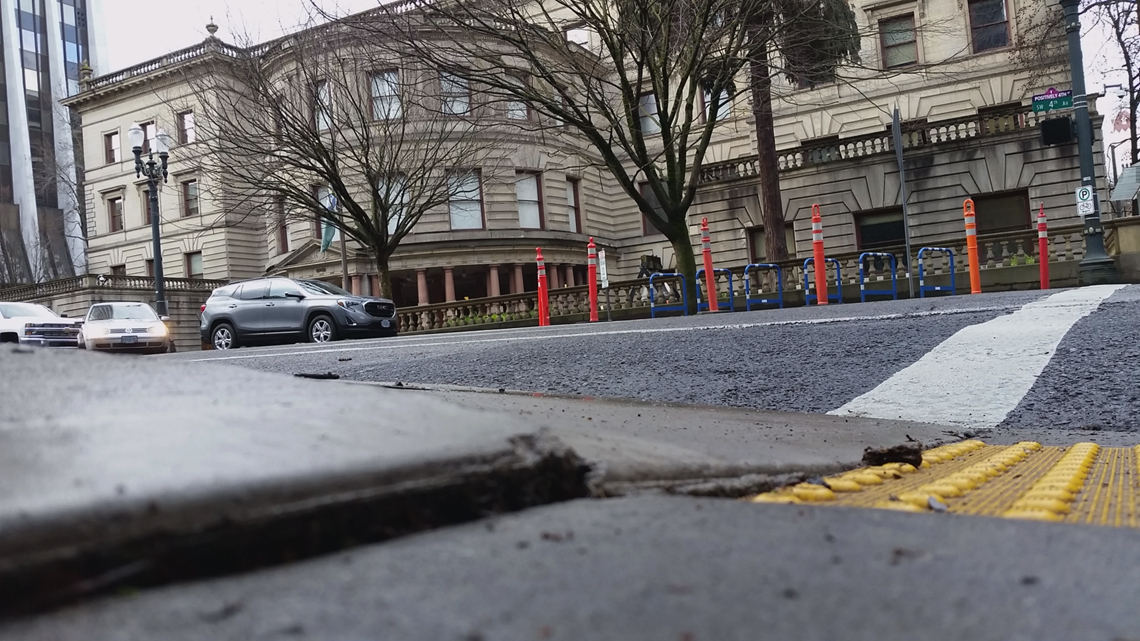
According to Bell, the system seems unfair. “It feels like a double standard to a citizen. This is the expectation and it doesn't feel like it’s being upheld on a city level.”
During the appeal hearing, Kyle testified about the condition of his sidewalk, and said the repair work was not needed because his sidewalk was safe.
“There are no trees along my property pushing up the sidewalks and there are no sinkholes, tripping hazards whatsoever.”
In fact, he told the city commissioners that the contractors the city used to fix his sidewalk made it even worse, and even after the repair the sidewalk is not up to the city's own code. He said PBOT’s repair crew violated its own policy concerning ‘partial square replacement.’

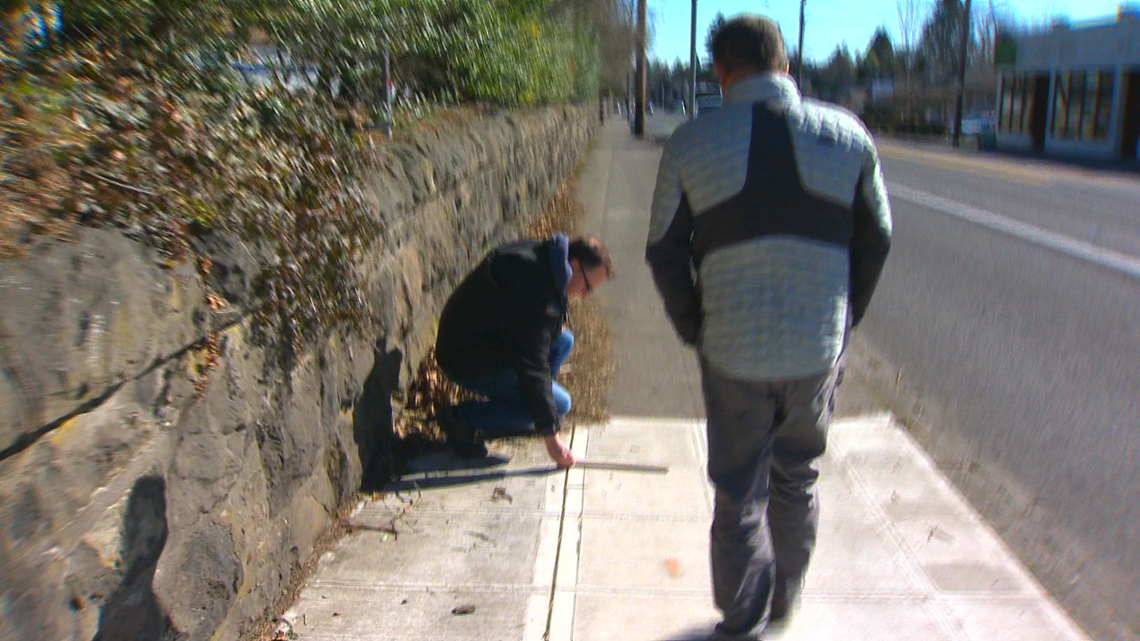
PBOT’s website states, ‘partial square replacement on a sidewalk will not be done.’ But when PBOT crews fixed Bell's sidewalk, they left him with several ‘partial triangles,’ and one in particular that already appears to be violating code. Despite the apparent discrepancy in the work performed, PBOT billed Bell $4,825 for the repair work.
During the appeal hearing, Commissioner JoAnn Hardesty asked PBOT manager Wasiak about the apparent subpar repair work.
“It looks like it's sticking up more now than when it was when he was told that he had to repair it. What's the city's response when the repair is inadequate?" Hardesty asked.
Wasiak responded, “The work is guaranteed for three years, so we can go and fix that.”
When asked by Hardesty if they’ve do so, Wasiak replied, “We have not done so, I'm learning of this now.”
The exchange prompted this response from Commissioner Nick Fish: “We seem uniquely unqualified to hear this appeal quite honestly.”
Ultimately, the commissioners ruled against Bell. Hardesty was the only commissioner to rule in his favor. He was ordered to pay $4,825 for the sidewalk repair work.
“It's tough to fight City Hall," Bell said.
When the City of Portland uses one of its contractors to repair your sidewalk, you are required to pay for it, but PBOT offers a three-year guarantee on the concrete work. Homeowners can do the work themselves or hire a contractor but will need a permit and have to comply with all city codes. Bell said these options were never mentioned to him.
PBOT admits ‘sidewalk improvement’ is not a perfect science, and that these options need to be clearer to homeowners. Agency officials said they are working to improve their policies.
Apparent violations at officials' homes Enforcement varies
Editor's note: In the video above, a bill for the homeowner is said to be $4,285. As the graphic on the video correctly notes, the actual amount is $4,825.
It boils down to this: City leaders in Portland use a specific set of guidelines to determine whose sidewalk is dangerous and whose is safe. City commissioners and Bureau of Transportation leaders all know those guidelines, and there's not much "wiggle room" when they order repairs and bill the homeowners for the work. But city leaders also want everyone in Portland to be proactive and fix their own dangerous sidewalks to keep everyone safe. But does this program apply to everyone equally?
When the Bell case was ruled on, city commissioners said sidewalk safety in Portland is paramount. Commissioner Amanda Fritz noted, “The complaint was made, and the repairs were needed!”
Fish agreed, saying “Mr. Bell received notice of the violation, he chose not to take action, the city by code stepped in for him and did the work.”
PBOT’s commissioner, Chloe Eudaly, also ruled against Bell’s appeal. “Today, we have to use the rules that are in place," Eudaly said.
And Portland Mayor Ted Wheeler said Bell needed to pay for his sidewalk repair, just like everyone else in Portland. “The process today is one that is uniformly enforced across the city.”
Is the sidewalk repair system in Portland "uniformly enforced across the city?" Does every Portland homeowner play by the same rules? There appear to be variations in enforcement.
When KGW went to Mayor Wheeler’s home to look at his sidewalk, we found a ‘tripping hazard’ that is not only dangerous, but an obvious violation of the city's ‘half-inch’ standard.

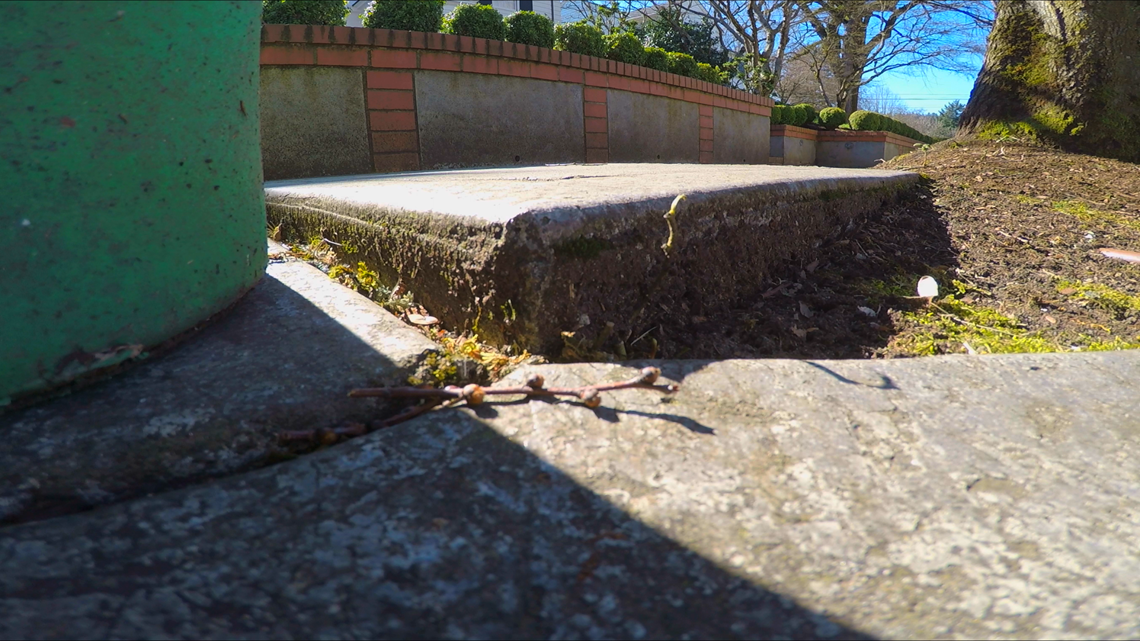
We asked the mayor if he knows he's violating the same code he uses to judge other Portland homeowners when he sticks them with a hefty repair bill. “I actually do, I'll be the first to admit, I know it needs to be done and I have procrastinated.”
Mayor Wheeler also told us there is a tree near his home that pushes up a portion of his sidewalk. He’s had it repaired before, and will now repair it again.
But Wheeler is not the only city commissioner in apparent violation of city code. During Bell's appeal, Transportation Commissioner Chloe Eudaly, the commissioner in charge of the sidewalk repair inspection process, talked about how vitally important safe sidewalks are, adding, “As the mother of a now almost 18-year-old child who uses a wheelchair, that sidewalk repair, maintaining that public asset and maintaining access and safety is important.”
However, the sidewalk in front of Commissioner Eudaly's home is markedly uneven. Eudaly rents her home, but as the head of the Portland Bureau of Transportation, she knows as well as anyone that her sidewalk is a violation. And she knows how to report it. One call or email to the agency she oversees could lead to repairs, but that could prove expensive for the property owner.

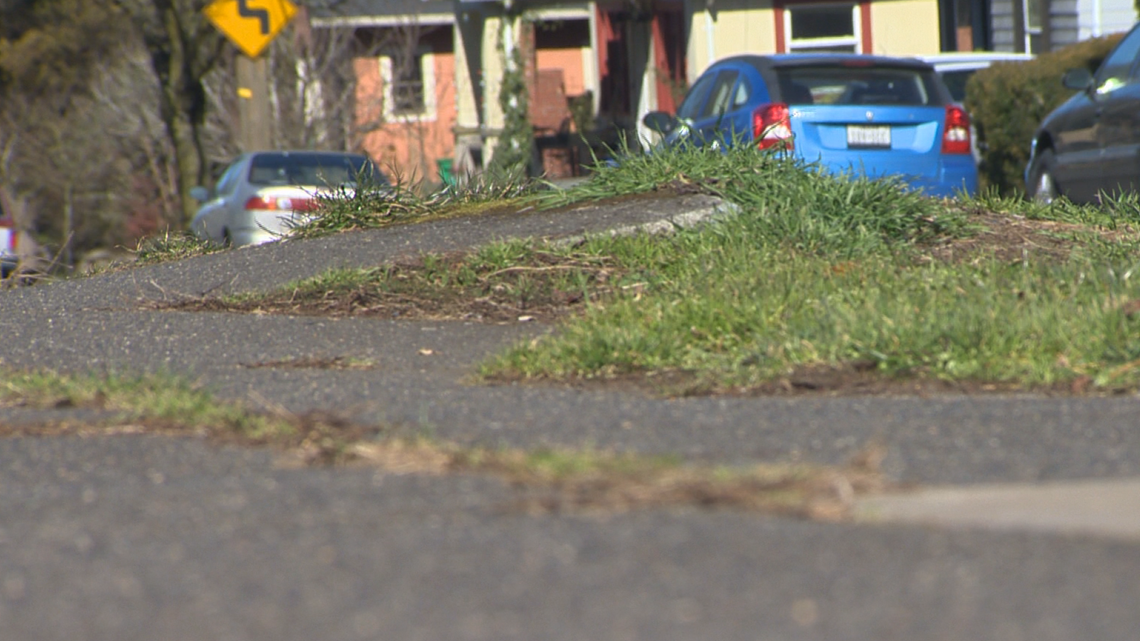
Commissioner Eudaly’s office emailed a statement, saying, “As the Transportation Commissioner and the mother of a child who uses a wheelchair, she is naturally very supportive of code-based sidewalk improvements that make moving around our city safer and accessible for all Portlanders.”
Her office did not respond to a follow-up question as to whether the apparent violation in front of her residence had been reported.
“Right in front of her house does seem really ironic and hypocritical, that's really disappointing," said Bell, the homeowner who lost the appeal on his own property.
Commissioner Nick Fish lives in an apartment. The sidewalk on his corner, right in front of his apartment building, is another apparent violation - this one was big enough to be measured with a tube of Chapstick. It appears well beyond the ‘half-inch’ city standard that PBOT describes as a hazard that results in ‘trips and falls.’

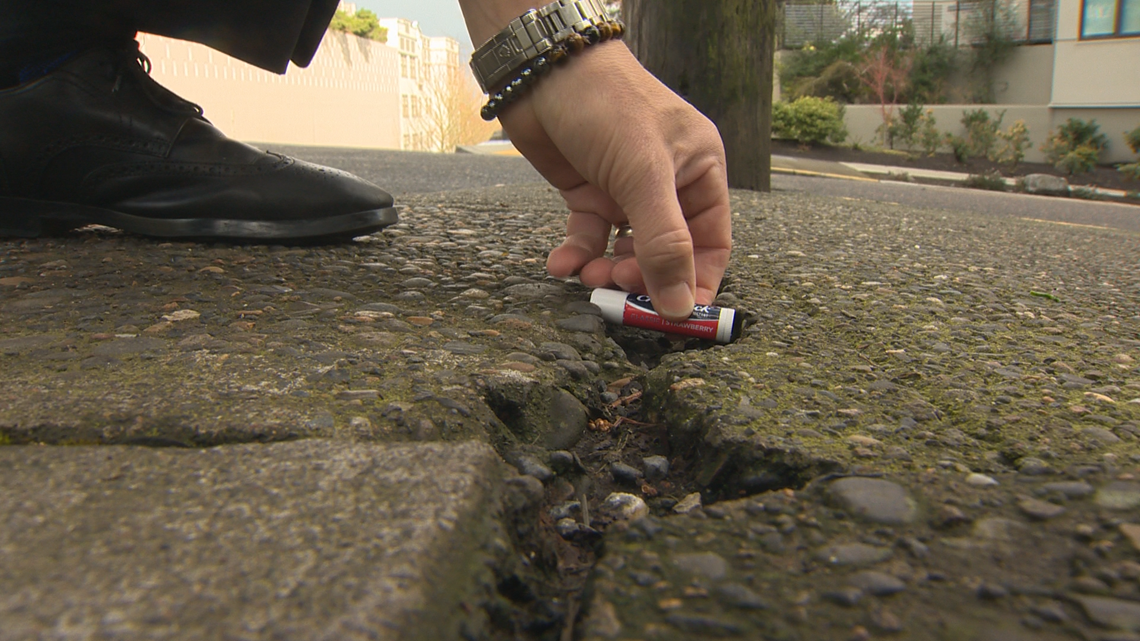
We asked Fish about the violation, he told us, “We're going to defer to the commissioner-in-charge (Eudaly) to speak for the city on this one.”
At the sidewalk in front of the house of the man who runs the entire "sidewalk-repair-inspection-process," PBOT Interim Director Chris Warner, that sidewalk stretch also seemed to be outside of city code.
When asked about the violation of his sidewalk, Warner told us, “I pledge to fix my sidewalk quickly, so that my neighbors and others can get around easily and safely.”
The city code is clear that Portland homeowners are required to keep their sidewalks in good shape, a point that Kyle Bell wishes would apply to city officials as well.
“I'm as subject to the laws and ordinances as anybody else. It’s on me, it’s my responsibility and I need to get it done," said Wheeler, about his own apparent violation.
Photography and videography by Steven Redlin/KGW


